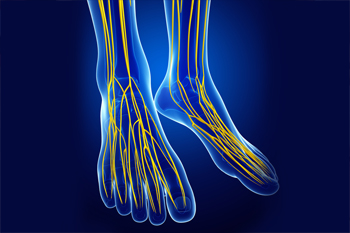Items filtered by date: February 2021
Do I Have Gout, or Pseudogout?
 Gout is a form of arthritis that often affects the joints of the feet and ankles. Gout is caused by a buildup of uric acid in the bloodstream forming crystals in the affected joint. This leads to symptoms such as sudden and severe pain, redness, swelling, and warmth in the joint. Pseudogout is a similar condition and can also affect the joints of the feet and ankles, causing severe pain. Unlike gout, however, pseudogout is caused by a buildup of calcium pyrophosphate crystals in the affected joint. It is important to get an accurate diagnosis for these conditions, as their treatments vary. A podiatrist can diagnose gout or pseudogout by performing a thorough physical examination, asking about your medical history, and taking a fluid sample from the affected joint to see if either uric acid or calcium pyrophosphate is present in the sample. Imaging studies, such as X-rays, ultrasounds, or CT scans may also be needed to get an accurate diagnosis. If you have symptoms of either of these conditions, it is recommended that you see a podiatrist as soon as possible.
Gout is a form of arthritis that often affects the joints of the feet and ankles. Gout is caused by a buildup of uric acid in the bloodstream forming crystals in the affected joint. This leads to symptoms such as sudden and severe pain, redness, swelling, and warmth in the joint. Pseudogout is a similar condition and can also affect the joints of the feet and ankles, causing severe pain. Unlike gout, however, pseudogout is caused by a buildup of calcium pyrophosphate crystals in the affected joint. It is important to get an accurate diagnosis for these conditions, as their treatments vary. A podiatrist can diagnose gout or pseudogout by performing a thorough physical examination, asking about your medical history, and taking a fluid sample from the affected joint to see if either uric acid or calcium pyrophosphate is present in the sample. Imaging studies, such as X-rays, ultrasounds, or CT scans may also be needed to get an accurate diagnosis. If you have symptoms of either of these conditions, it is recommended that you see a podiatrist as soon as possible.
Gout is a foot condition that requires certain treatment and care. If you are seeking treatment, contact Philip Hahn, DPM from Advanced Foot & Ankle Center. Our doctor will treat your foot and ankle needs.
What Is Gout?
Gout is a type of arthritis caused by a buildup of uric acid in the bloodstream. It often develops in the foot, especially the big toe area, although it can manifest in other parts of the body as well. Gout can make walking and standing very painful and is especially common in diabetics and the obese.
People typically get gout because of a poor diet. Genetic predisposition is also a factor. The children of parents who have had gout frequently have a chance of developing it themselves.
Gout can easily be identified by redness and inflammation of the big toe and the surrounding areas of the foot. Other symptoms include extreme fatigue, joint pain, and running high fevers. Sometimes corticosteroid drugs can be prescribed to treat gout, but the best way to combat this disease is to get more exercise and eat a better diet.
If you have any questions please feel free to contact our office located in Texarkana, TX . We offer the newest diagnostic and treatment technologies for all your foot and ankle needs.
Can You Pinch a Nerve in Your Foot?
 Pinched nerves occur when excessive pressure is placed on a nerve by the surrounding tissues. This can happen in the feet due to an injury, from wearing poorly fitted shoes, or from having flat feet, bone spurs, or arthritis, among many other possible causes. A pinched nerve can cause a variety of symptoms, including aching, sharp, or burning pain, numbness, tingling, or a “pins and needles” sensation in the affected foot, along with muscle weakness. The symptoms can occur on the bottom of your foot, at your heel, or in the ball of your foot. Nerve pain may radiate out to the arch or toes. To learn more about pinched nerves in the feet, please consult with a podiatrist.
Pinched nerves occur when excessive pressure is placed on a nerve by the surrounding tissues. This can happen in the feet due to an injury, from wearing poorly fitted shoes, or from having flat feet, bone spurs, or arthritis, among many other possible causes. A pinched nerve can cause a variety of symptoms, including aching, sharp, or burning pain, numbness, tingling, or a “pins and needles” sensation in the affected foot, along with muscle weakness. The symptoms can occur on the bottom of your foot, at your heel, or in the ball of your foot. Nerve pain may radiate out to the arch or toes. To learn more about pinched nerves in the feet, please consult with a podiatrist.
Foot Pain
Foot pain can be extremely painful and debilitating. If you have a foot pain, consult with Philip Hahn, DPM from Advanced Foot & Ankle Center. Our doctor will assess your condition and provide you with quality foot and ankle treatment.
Causes
Foot pain is a very broad condition that could be caused by one or more ailments. The most common include:
- Bunions
- Hammertoes
- Plantar Fasciitis
- Bone Spurs
- Corns
- Tarsal Tunnel Syndrome
- Ingrown Toenails
- Arthritis (such as Gout, Rheumatoid, and Osteoarthritis)
- Flat Feet
- Injury (from stress fractures, broken toe, foot, ankle, Achilles tendon ruptures, and sprains)
- And more
Diagnosis
To figure out the cause of foot pain, podiatrists utilize several different methods. This can range from simple visual inspections and sensation tests to X-rays and MRI scans. Prior medical history, family medical history, and any recent physical traumatic events will all be taken into consideration for a proper diagnosis.
Treatment
Treatment depends upon the cause of the foot pain. Whether it is resting, staying off the foot, or having surgery; podiatrists have a number of treatment options available for foot pain.
If you have any questions, please feel free to contact our office located in Texarkana, TX . We offer the newest diagnostic and treatment technologies for all your foot care needs.
Plantar Warts Can Be Treated!
Necessary Care for a Broken Foot
 A broken foot can happen as a result of falling or enduring a sudden injury. The healing process can begin when a proper diagnosis is performed, which generally means having an X-ray taken. This is commonly followed by wearing a protective boot or cast, and it may help existing swelling when the foot is frequently elevated. The boot or cast may aid in walking while attempting to complete daily activities. If the fracture is severe, and the bone is protruding from the skin, surgery may be necessary for proper healing. It is suggested that you consult with a podiatrist if you have broken your foot.
A broken foot can happen as a result of falling or enduring a sudden injury. The healing process can begin when a proper diagnosis is performed, which generally means having an X-ray taken. This is commonly followed by wearing a protective boot or cast, and it may help existing swelling when the foot is frequently elevated. The boot or cast may aid in walking while attempting to complete daily activities. If the fracture is severe, and the bone is protruding from the skin, surgery may be necessary for proper healing. It is suggested that you consult with a podiatrist if you have broken your foot.
A broken foot requires immediate medical attention and treatment. If you need your feet checked, contact Philip Hahn, DPM from Advanced Foot & Ankle Center. Our doctor can provide the care you need to keep you pain-free and on your feet.
Broken Foot Causes, Symptoms, and Treatment
A broken foot is caused by one of the bones in the foot typically breaking when bended, crushed, or stretched beyond its natural capabilities. Usually the location of the fracture indicates how the break occurred, whether it was through an object, fall, or any other type of injury.
Common Symptoms of Broken Feet:
- Bruising
- Pain
- Redness
- Swelling
- Blue in color
- Numbness
- Cold
- Misshapen
- Cuts
- Deformities
Those that suspect they have a broken foot shoot seek urgent medical attention where a medical professional could diagnose the severity.
Treatment for broken bones varies depending on the cause, severity and location. Some will require the use of splints, casts or crutches while others could even involve surgery to repair the broken bones. Personal care includes the use of ice and keeping the foot stabilized and elevated.
If you have any questions please feel free to contact our office located in Texarkana, TX . We offer the newest diagnostic and treatment technologies for all your foot and ankle needs.
Can Neuropathy Be Inherited?
 Peripheral neuropathy is the result of nerve damage that occurs in the extremities such as the hands and feet. When this peripheral neuropathy is inherited, it is known as Charcot-Marie-Tooth, or CMT. Charcot-Marie-Tooth affects people worldwide. While CMT is not life threatening, it does lead to the loss of mobility and function in the extremities as the nerves degenerate. There are many different genetic causes for CMT, but most cases have a variety of similar symptoms. These symptoms include having high arched feet, structural foot deformities and weakening of the muscles. Patients who are suffering from CMT should consult with a podiatrist for treatment options that can help improve function. Treatment options may include physical therapy, bracing, wearing properly fitting footwear, and maintaining a healthy weight.
Peripheral neuropathy is the result of nerve damage that occurs in the extremities such as the hands and feet. When this peripheral neuropathy is inherited, it is known as Charcot-Marie-Tooth, or CMT. Charcot-Marie-Tooth affects people worldwide. While CMT is not life threatening, it does lead to the loss of mobility and function in the extremities as the nerves degenerate. There are many different genetic causes for CMT, but most cases have a variety of similar symptoms. These symptoms include having high arched feet, structural foot deformities and weakening of the muscles. Patients who are suffering from CMT should consult with a podiatrist for treatment options that can help improve function. Treatment options may include physical therapy, bracing, wearing properly fitting footwear, and maintaining a healthy weight.
Neuropathy
Neuropathy can be a potentially serious condition, especially if it is left undiagnosed. If you have any concerns that you may be experiencing nerve loss in your feet, consult with Philip Hahn, DPM from Advanced Foot & Ankle Center. Our doctor will assess your condition and provide you with quality foot and ankle treatment for neuropathy.
What Is Neuropathy?
Neuropathy is a condition that leads to damage to the nerves in the body. Peripheral neuropathy, or neuropathy that affects your peripheral nervous system, usually occurs in the feet. Neuropathy can be triggered by a number of different causes. Such causes include diabetes, infections, cancers, disorders, and toxic substances.
Symptoms of Neuropathy Include:
- Numbness
- Sensation loss
- Prickling and tingling sensations
- Throbbing, freezing, burning pains
- Muscle weakness
Those with diabetes are at serious risk due to being unable to feel an ulcer on their feet. Diabetics usually also suffer from poor blood circulation. This can lead to the wound not healing, infections occurring, and the limb may have to be amputated.
Treatment
To treat neuropathy in the foot, podiatrists will first diagnose the cause of the neuropathy. Figuring out the underlying cause of the neuropathy will allow the podiatrist to prescribe the best treatment, whether it be caused by diabetes, toxic substance exposure, infection, etc. If the nerve has not died, then it’s possible that sensation may be able to return to the foot.
Pain medication may be issued for pain. Electrical nerve stimulation can be used to stimulate nerves. If the neuropathy is caused from pressure on the nerves, then surgery may be necessary.
If you have any questions, please feel free to contact our office located in Texarkana, TX . We offer the newest diagnostic and treatment technologies for all your foot care needs.





